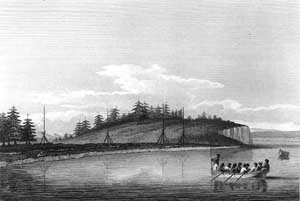On May 8, 1792, British Royal Navy Captain George Vancouver (1757-1798) names an extensive bay at the northeast corner of the Olympic Peninsula for the Marquis of Townshend, a British general. The "h" is later dropped and the bay is now called Port Townsend. The city of Port Townsend, now the county seat of Jefferson County, is founded in the 1850s at the mouth of the bay and adopts its name.
Vancouver’s expedition left England in 1791 in the ships Discovery and Chatham to explore the Northwest Coast of North America. By May 1792, the expedition had entered the Strait of Juan de Fuca and was exploring its southern shore, the northern side of the Olympic Peninsula. In making maps of the regions he explored, Vancouver named the features he encountered for his friends, patrons, crewmembers, and even his ships.
On May 2, 1792, Discovery and Chatham entered a well-protected natural harbor toward the east end of the Strait, which Vancouver named Port Discovery for his ship. The expedition remained at anchor several days while the crew made repairs and took on supplies of wood and water. Leaving much of the crew with the anchored ships, Vancouver set out on May 7, 1792, with a party in three small boats to explore the surrounding area. They rounded the Quimper Peninsula, the neck of land jutting off the Olympic Peninsula that separates Port Discovery from the harbor of Port Townsend, and camped that night on a swampy spit of land, which Vancouver named Point Hudson, at the entrance to Port Townsend harbor.
A Safe and Capacious Harbor
The next day, May 8, 1792, Vancouver wrote in his log that the bay stretching south from the campsite on the point was:
"a very safe and more capacious harbor than Port Discovery; and rendered more pleasant by the high land being at a greater distance from the water-side" (Morgan, 35).
He added:
"To this port I gave the name of Port Townshend, in honor of the noble Marquis of that name" (Morgan, 35).
George Townshend, the marquis Vancouver honored, was a British general who served with the force that took Quebec from the French in 1759.
Although the American explorers and settlers who followed Vancouver to the region retained the name that he bestowed on the bay, they dropped the "h." The United States Exploring Expedition of 1841, led by Lt. Charles Wilkes (1798-1877), charted the bay as Port Townsend, and that is the spelling used today.
The first Americans settled on the bay in 1851. In October of that year, Alfred A. Plummer (1822-1883), Charles Bachelder, Loren B. Hastings (1814-1881), and Francis W. Pettygrove (d. 1887) met in the cabin Plummer and Bachelder had erected on the beach below Point Hudson and agreed to establish a town on the site. They named the proposed town "after the bay on which it was situated, Port Townsend" (Meany, 228). Port Townsend soon became the site of the U.S. Customs port of entry, the county seat of newly formed Jefferson County, and one of the leading settlements in Washington Territory.

